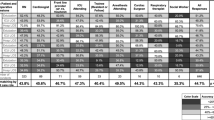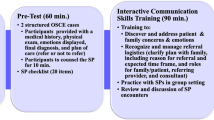Abstract
Effective communication is vital for develo** a positive physician–patient. The parents often serve as a proxy to report the quality of life and healthcare after surgery in children with neurological diseases. The lack of communication, miscommunication, and loss of information in transition commonly affects the parent counseling, expectations and satisfaction. The ability of parents to serve as a proxy depends on their understanding of the disease process, treatment strategies, associated morbidities and outcomes following surgery. Therefore, it is imperative to understand the parent expectations and bridge communication gaps to optimize each step of healthcare throughout a child’s journey following the diagnosis of neurological disorder, and hence increase the parent and patient satisfaction and quality of care in pediatric neurosurgery.
Access this chapter
Tax calculation will be finalised at checkout
Purchases are for personal use only
Similar content being viewed by others

References
Lipkin PH, alexander J, Cartwright JD, Desch LW, Duby JC, Edwards DR, Elias ER, Johnson CP, Levey EB, Murphy NA, Myers S. Care coordination in the medical home: integrating health and related systems of care for children with special health care needs. Pediatrics. 2005;116(5):1238–44.
Ireys HT, Anderson GF, Shaffer TJ, Neff JM. Expenditures for care of children with chronic illnesses enrolled in the Washington State Medicaid program, fiscal year 1993. Pediatrics. 1997;100(2 Pt 1):197–204.
Neff JM, Anderson G. Protecting children with chronic illness in a competitive marketplace. JAMA. 1995;274(23):1866–9.
Simon TD, Riva-Cambrin J, Srivastava R, Bratton SL, Dean JM, Kestle JR. Hospital care for children with hydrocephalus in the United States: utilization, charges, comorbidities, and deaths. J Neurosurg Pediatr 2008;1(2):131–137.
Grosse SD, Ouyang L, Collins JS, Green D, Dean JH, Stevenson RE. Economic evaluation of a neural tube defect recurrence-prevention program. Am J Prev Med 2008;35(6):572–7.
Kshettry VR, Kelly ML, Rosenbaum BP, Seicean A, Hwang L, Weil RJ. Myelomeningocele: surgical trends and predictors of outcome in the United States, 1988–2010. J Neurosurg Pediatr 2014;13(6):666–678.
Larkin DJ, Swanson RC, Fuller S, Cortese DA. The Affordable Care Act: a case study for understanding and applying complexity concepts to health care reform. J Eval Clin Pract. 2014.
Ygge BM, Arnetz JE. Quality of paediatric care: application and validation of an instrument for measuring parent satisfaction with hospital care. Int J Qual Health Care: J Int Soc Qual Health Care/ISQua. 2001;13(1):33–43.
Charles C, Gafni A, Whelan T. Shared decision-making in the medical encounter: what does it mean? (or it takes at least two to tango). Soc Sci Med. (1982). 1997;44(5):681–692.
Protection of human subjects; reports of the President's Commission for the Study of Ethical Problems in Medicine and Biomedical and Behavioral Research--Office of the Assistant Secretary for Health, HHS. Notice of availability of reports. Federal register. 1983;48(146):34408–34412.
Bugge C, Entwistle VA, Watt IS. The significance for decision-making of information that is not exchanged by patients and health professionals during consultations. Soc Sci Med. 2006;63(8):2065–2078.
V. E. Patient involvement in decision-making: the importance of a broad conceptualization. In: Edwards A, Elwyn G, ed. Shared Decision-Making in healthcare. 2nd ed. Oxford: Oxford University Press 2009:17–22.
Lurie JD, Weinstein JN. Shared decision-making and the orthopaedic workforce. Clin Orthop Relat Res. 2001;385:68–75.
Shabason JE, Mao JJ, Frankel ES, Vapiwala N. Shared decision-making and patient control in radiation oncology: implications for patient satisfaction. Cancer. 2014;120(12):1863–70.
Mancuso CA, Cammisa FP, Sama AA, Hughes AP, Ghomrawi HM, Girardi FP. Development and testing of an expectations survey for patients undergoing lumbar spine surgery. J Bone Joint Surg. American volume. 2013;95(19):1793–1800.
McGregor AH, Dore CJ, Morris TP. An exploration of patients’ expectation of and satisfaction with surgical outcome. European spine journal: official publication of the European Spine Society, the European Spinal Deformity Society, and the European Section of the Cervical Spine Research Society. 2013;22(12):2836–44.
Ronnberg K, Lind B, Zoega B, Halldin K, Gellerstedt M, Brisby H. Patients’ satisfaction with provided care/information and expectations on clinical outcome after lumbar disc herniation surgery. Spine. 2007;32(2):256–61.
Toyone T, Tanaka T, Kato D, Kaneyama R, Otsuka M. Patients’ expectations and satisfaction in lumbar spine surgery. Spine. 2005;30(23):2689–94.
Waljee J, McGlinn EP, Sears ED, Chung KC. Patient expectations and patient-reported outcomes in surgery: a systematic review. Surgery. 2014;155(5):799–808.
Yee A, Adjei N, Do J, Ford M, Finkelstein J. Do patient expectations of spinal surgery relate to functional outcome? Clin Orthop Relat Res. 2008;466(5):1154–61.
Sitzia J, Wood N. Patient satisfaction: a review of issues and concepts. Soc Sci Med (1982). Dec 1997;45(12):1829–1843.
Kravitz RL. Patients’ expectations for medical care: an expanded formulation based on review of the literature. Medical care research and review: MCRR. 1996;53(1):3–27.
Fidanci BE AF, Fidanci K Parents’ Expectations and Satisfaction on Pediatrics Clinic. Transcr Open Access (Sunnyvale). 2014 4(137).
Suhonen R, Valimaki M, Leino-Kilpi H. Individualized care, quality of life and satisfaction with nursing care. J Adv Nurs. 2005;50(3):283–92.
Smith J, Cheater F, Bekker H, Chatwin J. Are parents and professionals making shared decisions about a child's care on presentation of a suspected shunt malfunction: a mixed method study? Health expectations: an international journal of public participation in health care and health policy. 2013.
Shiminski-Maher T. Physician-patient-parent communication problems. Pediatr Neurosurg 1993;19(2):104–8.
Roscigno CI, Grant G, Savage TA, Philipsen G. Parent perceptions of early prognostic encounters following children’s severe traumatic brain injury: ‘locked up in this cage of absolute horror’ . Brain Inj. 2013;27(13–14):1536–48.
Mitchell-Dicenso A, Guyatt G, Paes B, et al. A new measure of parent satisfaction with medical care provided in the neonatal intensive care unit. J Clin Epidemiol. 1996;49(3):313–8.
Hsiao JL, Evan EE, Zeltzer LK. Parent and child perspectives on physician communication in pediatric palliative care. Palliat Support Care. 2007;5(4):355–65.
Conner JM, Nelson EC. Neonatal intensive care: satisfaction measured from a parent's perspective. Pediatrics. 1999;103(1 Suppl E):336–349.
Informed consent, parental permission, and assent in pediatric practice. Committee on Bioethics, American Academy of Pediatrics. Pediatrics. 1995;95(2):314–317.
Mercurio MR, Adam MB, Forman EN, Ladd RE, Ross LF, Silber TJ. American Academy of Pediatrics policy statements on bioethics: summaries and commentaries: part 1. Pediatr Rev/Am Acad Pediatr. 2008;29(1):e1-8.
Hart C, Chesson R. Children as consumers. 1998;316.
Ibanga AJ IH. Psychological Issues in Paediatric Surgery. In: Ameh EA, Bickler SW, Lakhoo K, Nwomeh BC, Poenaru D, eds. Paediatric Surgery: A Comprehensive Text for Africa. WA, USA: Global HELP Organization; 2011.
Ainbinder JG, Blanchard LW, Singer GH, et al. A qualitative study of Parent to Parent support for parents of children with special needs. Consortium to evaluate Parent to Parent. J Pediatr Psychol. 1998;23(2):99–109.
Campbell HS, Phaneuf MR, Deane K. Cancer peer support programs-do they work? Patient Educ Couns. 2004;55(1):3–15.
Law M, King S, Stewart D, King G. The perceived effects of parent-led support groups for parents of children with disabilities. Phys Occup Ther Pediatr. 2001;21(2–3):29–48.
Santelli B, Turnbull A, Higgins C. Parent to parent support and health care. Pediatr Nurs. 1997;23(3):303–6.
Young MH, McMenamy JM, Perrin EC. Parent advisory groups in pediatric practices: parents’ and professionals’ perceptions. Arch Pediatr Adolesc Med. 2001;155(6):692–8.
Author information
Authors and Affiliations
Editor information
Editors and Affiliations
Rights and permissions
Copyright information
© 2021 The Author(s), under exclusive license to Springer Nature Switzerland AG
About this chapter
Cite this chapter
Chotai, S., Agrawal, A. (2021). Parent Expectations and Counselling in Pediatric Neurosurgery. In: Agrawal, A., Britz, G. (eds) Pediatric Vascular Neurosurgery. Springer, Cham. https://doi.org/10.1007/978-3-030-74749-7_20
Download citation
DOI: https://doi.org/10.1007/978-3-030-74749-7_20
Published:
Publisher Name: Springer, Cham
Print ISBN: 978-3-030-74748-0
Online ISBN: 978-3-030-74749-7
eBook Packages: MedicineMedicine (R0)



